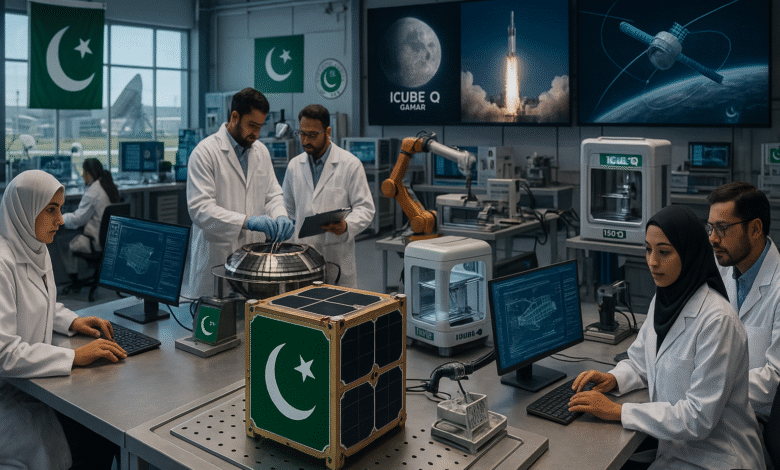Incredible Space Tech Innovations Coming from Pakistani Labs

Pakistan has emerged as a rising star in the global space technology landscape, with groundbreaking space tech innovations transforming the country’s scientific capabilities and positioning it among the world’s leading space-faring nations. From historic lunar missions to advanced satellite technologies, Pakistani laboratories are developing cutting-edge solutions that are reshaping the future of space exploration and technology applications.
Pakistan’s Space Journey: From Vision to Reality
The foundation of Pakistan’s space tech innovations began in 1961 with the establishment of the Space and Upper Atmosphere Research Commission (SUPARCO), making Pakistan one of the earliest countries to recognize the strategic importance of space technology. Over the decades, Pakistani scientists and engineers have consistently pushed boundaries, creating remarkable achievements that have captured global attention.
Today, Pakistan’s space program encompasses multiple research institutions, universities, and laboratories working collaboratively to advance space tech innovations across various domains including satellite technology, lunar exploration, remote sensing, and space weather monitoring.
SUPARCO: Leading Pakistan’s Space Tech Revolution
Advanced Satellite Development Programs
SUPARCO stands at the forefront of Pakistan’s space tech innovations, with an impressive portfolio of satellite development and space technology applications. The organization has successfully developed and launched multiple satellites, including the Pakistan Remote Sensing Satellite (PRSS-1) and Pakistan Technology Evaluation Satellite (PakTES-1A), which provide crucial services for national development.
The recent deployment of Pakistan’s advanced remote sensing satellite in July 2025 marks a significant milestone in space tech innovations. The satellite established stable communication with ground stations and has begun transmitting high-resolution images, enabling the availability of data for various national sectors. This achievement demonstrates Pakistan’s growing capabilities in satellite technology and data processing.
Revolutionary RESOLVE R&D Labs
In a groundbreaking initiative, SUPARCO inaugurated its state-of-the-art RESOLVE R&D Lab at multiple locations including the University of Engineering and Technology (UET) and the National Center for Remote Sensing and Geo-Informatics (NCRG) in Karachi. These space tech innovations facilities aim to establish technological research labs across North, Central, and South Pakistan, creating a collaborative ecosystem for advanced space technology research.
The RESOLVE initiative represents a new approach to space tech innovations, providing high-performance computing resources and fostering an open, collaborative environment that enables researchers to address complex, real-world challenges in space technology.
Space Weather Monitoring Excellence
Pakistani laboratories have made significant strides in space tech innovations related to space weather monitoring. SUPARCO has established the Pakistan Space Weather Center, which employs an array of instruments to observe space weather phenomena in real time. This facility represents one of the most advanced space tech innovations in the region, providing critical data for satellite communications, navigation systems, and power grids.
Institute of Space Technology: Pioneering Educational Excellence
Historic Lunar Mission Success
The Institute of Space Technology (IST) has achieved a historic milestone with the iCube Qamar lunar mission, representing Pakistan’s first deep-space exploration venture. ICUBE-Q or ICUBE-QAMAR is a Pakistani lunar remote sensing nanosatellite and one of the four international payloads of the Chang’e 6 lunar sample-return mission.
This remarkable achievement in space tech innovations resulted from collaboration between IST, SUPARCO, and China’s Shanghai Jiao Tong University. The satellite transmitted its first images back to Earth on 11 May 2024 captured from a distance of 200 kilometres from the Moon.
CubeSat Technology Leadership
IST has established itself as a leader in space tech innovations through its CubeSat development program. Institute of Space Technology on 21 November 2013, launched Pakistan’s first Cubesat satellite, ICUBE-1, onboard Dnepr launch vehicle from Yasny launch base, Russia. This achievement marked Pakistan’s entry into the exclusive club of nations capable of developing and operating miniature satellites.
The success of ICUBE-1 paved the way for more advanced space tech innovations, leading to the development of sophisticated lunar exploration capabilities demonstrated by the iCube Qamar mission.
Advanced Research Facilities
IST’s commitment to space tech innovations is evident in its state-of-the-art research facilities and laboratories. The institute offers specialized programs in aerospace engineering, space sciences, and satellite technology, creating a new generation of space technology experts for Pakistan’s growing space industry.
National University of Sciences and Technology (NUST): Engineering Excellence
Aerospace Engineering Programs
NUST has significantly contributed to Pakistan’s space tech innovations through its comprehensive aerospace engineering programs. The Aerospace Engineering Department at SMME, NUST aims to explore new frontiers to excel in the field of Aerospace Engineering. The university offers cutting-edge curriculum that encompasses foundational principles and advanced technologies in aerospace engineering.
College of Aeronautical Engineering
College of Aeronautical Engineering (CAE) is a well established teaching institution of Aeronautical Engineering which offers undergraduate and postgraduate programs in Aerospace and Avionics Engineering. Established in 1965 at Korangi Creek, Karachi with the help of United States Air Force, CAE has grown into one of the finest institutions in its field of specialization.
This institution has been instrumental in developing space tech innovations and training aerospace engineers who contribute to Pakistan’s space program and aviation industry.
Recent Breakthrough Achievements in Space Tech Innovations
Pakistan’s First Human Spaceflight Mission
In an unprecedented development, SUPARCO invited scientists, researchers, and students to contribute to the country’s first-ever human spaceflight mission. This initiative represents a quantum leap in Pakistan’s space tech innovations, as the country prepares to send its first astronaut to the Chinese Space Station.
The mission calls for innovative experiments to be conducted in extreme thermal, vacuum, and microgravity environments, showcasing Pakistan’s growing confidence in advanced space tech innovations.
Advanced Communication Satellites
Pakistan’s space tech innovations have expanded to include sophisticated communication satellites. SUPARCO launched another satellite, PakSAT-MM1 few days later. This high-power multimission satellite, designed to bolster communication infrastructure across the country, highlights Pakistan’s commitment to leveraging space technology for socio-economic development.
These developments demonstrate how Pakistani laboratories are creating practical applications of space tech innovations that directly benefit the nation’s communication infrastructure and connectivity.
Remote Sensing and Earth Observation
Pakistani research institutions have made remarkable progress in space tech innovations related to Earth observation and remote sensing. SUPARCO is the pioneer in introducing Remote Sensing/GIS along with its allied technologies in Pakistan. Turnkey solutions and services are provided to different users in varied disciplines fields.
These space tech innovations support crucial applications including:
- Urban planning and development
- Agricultural monitoring and management
- Disaster management and early warning systems
- Climate change research and environmental monitoring
- Natural resource exploration and management
International Collaborations Driving Innovation
Strategic Partnerships with Global Space Agencies
Pakistan’s space tech innovations benefit significantly from international collaborations. The country has established partnerships with space agencies and institutions in China, the United Kingdom, and other nations, facilitating knowledge transfer and joint research initiatives.
These collaborations have accelerated the development of space tech innovations and provided Pakistani scientists with access to advanced technologies and expertise from leading space-faring nations.
Asia-Pacific Space Cooperation Organization (APSCO)
Pakistan’s participation in APSCO has opened new avenues for space tech innovations. Through this platform, Pakistani researchers collaborate on multilateral space projects, sharing costs and expertise while gaining access to advanced space technologies and missions.
Emerging Technologies and Future Prospects
Artificial Intelligence and Space Applications
Pakistani laboratories are integrating artificial intelligence into space tech innovations, developing smart satellite systems capable of autonomous operation and intelligent data processing. These advancements represent the next generation of space technology applications.
Nanotechnology in Space Systems
The miniaturization of space systems through nanotechnology represents a significant focus area for Pakistani space tech innovations. Research institutions are developing nano-satellites and micro-systems that offer cost-effective solutions for space exploration and Earth observation.
Green Space Technologies
Environmental sustainability has become a priority in Pakistan’s space tech innovations. Researchers are developing eco-friendly propulsion systems, solar-powered satellite technologies, and sustainable space exploration methods.
Educational Impact and Human Resource Development
Training the Next Generation
Pakistani universities and research institutions are producing highly skilled professionals in space technology fields. These educational programs ensure a steady pipeline of talent to support continued growth in space tech innovations.
Research and Development Programs
Advanced research programs at institutions like IST, NUST, and other universities are contributing to breakthrough discoveries in space tech innovations. These programs focus on both theoretical research and practical applications of space technology.
Economic Benefits and Commercial Applications
Satellite Services Industry
Pakistan’s space tech innovations have created a thriving satellite services industry, providing communication, navigation, and Earth observation services to both domestic and international clients. This sector contributes significantly to the country’s economy while demonstrating the practical value of space technology investments.
Technology Transfer and Innovation
The development of space tech innovations in Pakistani laboratories has led to spin-off technologies that benefit other industries including telecommunications, electronics, materials science, and computer technology.
Challenges and Solutions in Space Technology Development
Funding and Resource Management
Pakistani research institutions have developed innovative approaches to overcome funding challenges in space tech innovations. Through international partnerships, public-private collaborations, and efficient resource utilization, these laboratories continue to achieve remarkable results despite budget constraints.
Technical Expertise Development
Building technical expertise in advanced space tech innovations requires sustained investment in education and training. Pakistani institutions have addressed this challenge through international exchange programs, collaborative research projects, and specialized training initiatives.
Future Vision: Pakistan’s Space Technology Roadmap
Lunar Exploration Program
Following the success of iCube Qamar, Pakistan plans to expand its lunar exploration capabilities. SUPARCO revealed plans to send its lunar rover as part of China’s Chang’E 8 mission slated for 2028. This ambitious project represents the next phase of Pakistan’s space tech innovations in deep space exploration.
Advanced Satellite Constellation
Pakistan is developing plans for advanced satellite constellations that will provide comprehensive coverage for communication, navigation, and Earth observation services. These space tech innovations will position Pakistan as a regional leader in satellite services.
Space Manufacturing and In-Orbit Services
Looking toward the future, Pakistani laboratories are researching space tech innovations related to in-orbit manufacturing, satellite servicing, and space-based solar power systems. These emerging technologies represent the next frontier in space commercialization.
Also Read: How Tech and Innovation have Transformed the Dental Industry
Impact on Regional and Global Space Community
Regional Leadership
Pakistan’s achievements in space tech innovations have established the country as a regional leader in space technology development. Other developing nations look to Pakistan’s model of combining domestic innovation with strategic international partnerships.
Global Contributions
Pakistani research institutions contribute valuable scientific data and technological innovations to the global space community. These contributions enhance international understanding of space science and technology while demonstrating Pakistan’s growing capabilities in advanced space tech innovations.
Conclusion: A Bright Future for Pakistani Space Technology
The incredible space tech innovations emerging from Pakistani laboratories represent more than just technological achievements – they symbolize the country’s determination to excel in the most challenging fields of science and technology. From the historic lunar mission success to advanced satellite technologies and groundbreaking research initiatives, Pakistan has established itself as a serious player in the global space arena.
The collaborative approach adopted by Pakistani institutions, combining domestic innovation with international partnerships, has proven highly effective in accelerating space tech innovations. This model continues to drive progress across multiple domains of space technology, from miniaturized satellites to advanced Earth observation systems.
As Pakistan prepares for its first human spaceflight mission and expands its lunar exploration program, the foundation laid by current space tech innovations will support even more ambitious projects in the coming years. The country’s investment in education, research infrastructure, and international collaborations ensures a sustainable pipeline of innovation and expertise.
The future of Pakistani space technology looks incredibly promising, with emerging technologies like artificial intelligence, nanotechnology, and sustainable space systems opening new possibilities for space tech innovations. As Pakistani laboratories continue to push boundaries and achieve new milestones, they inspire a new generation of scientists and engineers while contributing valuable knowledge and capabilities to the global space community.
Pakistan’s journey in space technology demonstrates that with vision, determination, and strategic planning, any nation can achieve remarkable success in space tech innovations. The incredible achievements coming from Pakistani labs today are just the beginning of what promises to be an even more exciting future in space exploration and technology development.











